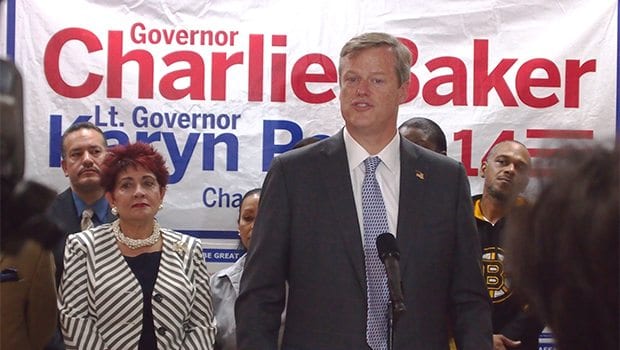

Gubernatorial candidate Charlie Baker chats with campaign operative Reynolds Graves and former state Transportation Secretary Richard Taylor during the opening of Baker’s Blue Hill Avenue office. (Banner photo)
Republican Charlie Baker opened an office on Blue Hill Avenue in Dorchester, unveiled an “urban agenda” with policies he said were informed by his discussions with people in black and Latino neighborhoods and touted support from blacks, Latinos and Asians.
Packed into the Blue Hill Avenue storefront, about 50 supporters, reporters and onlookers attended the event Wednesday morning last week, as Baker unveiled his priorities in education, affordable housing, criminal justice reform, economic development and public safety.
Baker said the plans — outlined in broad strokes — were culled from meetings with supporters in the black and Latino communities.
“The conversations and the dialogues that came out of these meetings … informed in a very significant way many of our economic development and education plans,” he said.
Some of Baker’s ideas were specific, like lifting the cap on charter schools — a move the state Senate flatly rejected last year. Others, like unleashing “the power of career and technical schools and explore the possibility of their granting associate degrees and training for careers, not jobs,” a bit less so.
Baker’s rhetoric touched on themes of inclusion and shared prosperity — not the typical fare of GOP candidates in other U.S. states.
“This is a great state,” Baker told the gathering. “It’s filled with great people from one end to the other. But there are too many folks in Massachusetts and too many places in Massachusetts that don’t feel the same vibe that exists in many of our communities. We will not be a truly great state until everybody who wants to work can, until every child when they get sent out the door in the morning gets to go to a school where they get the kind of education on which they can build a life, and where everybody lives in a community where they really do believe tomorrow’s going to be better than today.”
Conspicuously absent from his urban agenda was any mention of welfare reform — an issue that Baker has pushed aggressively in his campaign stops in white communities across the commonwealth.
Questioned by a reporter as to why he’s emphasizing a set of welfare reforms which have already been passed by the state Legislature, Baker said he wants voters to know he will implement the reforms.
“I think it’s important to inform people that I’m going to be an enthusiastic proponent of implementing the reforms,” he said. “Look, when you’re a candidate, you make proposals on a lot of things. But it’s actually kind of exciting when a series of proposals you made actually get translated and turned into law over the course of that campaign.”
Baker’s campaigning in cities marks a departure from the traditional Republican strategy of working the party’s base in suburbs, the South Shore, the North Shore and Worcester County.

Charlie Baker and developer Kirk Sykes. (Banner photo)
Those present at the Dorchester office opening were a mixture of black and Latino Republicans, like businessman Richard Taylor and activist Regla Gonzalez, and Democrats like political operative Clifton Braithwaite and developer Kirk Sykes.
“I think people are looking for solutions,” said Taylor, who served as state Transportation Secretary in the administration of former Gov. Bill Weld. “Have you seen another urban agenda by other candidates? Here’s a guy who’s thinking about this, who’s taken the time to ask the questions, developed an agenda and published it. We have something to hold him accountable to.”
Others in the room included Leonard Lee, Jean-Claude Sanon, Robert Lewis Jr., former state Sen. Bill Owens, former judge Joyce London Alexander Ford, David Eastmond and Darnell Williams.
Not all in the room were Baker endorsers. When Baker spoke, fewer than half those in attendance stood behind him to indicate support.
Like many in the room, Williams, who heads the Urban League of Eastern Massachusetts, has attended events for both Baker and Democratic gubernatorial contender Martha Coakley.
“This is about an urban agenda,” he said. “My job in the Urban League is to find solutions to urban problems.”
Republican candidates for statewide office typically garner between 3 and 5 percent of the vote in Boston’s black community. While Baker has drawn considerable attention to his campaign making several stops in black and Latino communities in Boston, the turnout at his events was a fraction of those hosted by the Coakley campaign.
Coakley has made campaign stops in Boston and elsewhere accompanied by Gov. Deval Patrick, First Lady Michelle Obama and numerous black and Latino elected officials.
Elected officials, including state Sen. Linda Dorcena Forry and Sheriff Steve Tompkins, are using their campaign offices and volunteers to support Coakley and other Democrats running for constitutional offices as part of the party’s coordinated campaign.
Lacking the Democratic Party’s extensive infrastructure in Boston, Baker has focused more on small group meetings in black and Latino communities. But the campaign is also planning to mount a ground game on Election Day, according to Hodari Cail, a political director for the Baker campaign.
“We’re in a good place,” Cail said. “People are coming out because they feel Charlie’s passion for the community. I’m excited about the next few weeks.”







